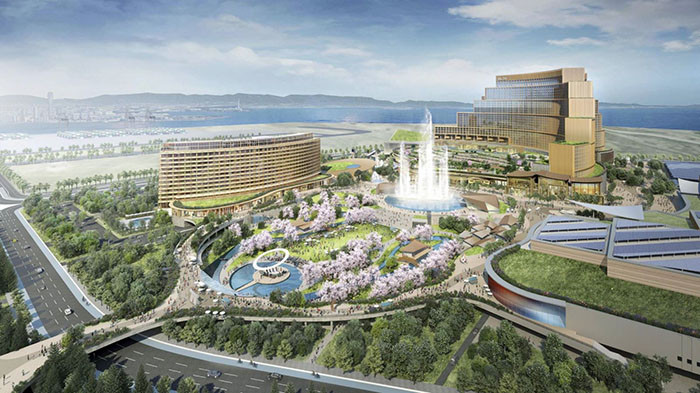The Japanese government is set to approve plans by Osaka Prefecture and Osaka City to open the country's first casino resort in 2029.

Design model of an integrated casino complex in Osaka. Photo: Kyodo
The move is seen as a major step in the ambition to turn Japan into an Asian gambling hub.
As Japan eases travel restrictions imposed during the Covid-19 pandemic, some local governments are returning to the idea of attracting tourists to integrated resorts (IRs), which include a large hotel, conference rooms and casino areas, Kyodo news agency reported.
Sources revealed that the central government will hold a meeting as early as April 14, where Japanese Prime Minister Fumio Kishida and relevant ministers are expected to approve Osaka's IR plan.
Previously, the Osaka prefectural and municipal governments aimed to complete construction and open the integrated resort by winter 2029 on the artificial island of Yumeshima in Osaka Bay.
A joint venture between US-based MGM Resorts International and Japan's Orix Group, the integrated resort is expected to attract about 20 million visitors annually and bring 1.14 trillion yen (about $8.5 billion) in annual economic benefits to the western Japan region.
Besides Osaka, Nagasaki Prefecture has also submitted plans to host the IR. However, the central government is likely to postpone any decision, citing the need for more time to assess the details of the construction development.
On July 20, 2018, the Japanese parliament passed a law allowing up to three IR projects to be developed. However, plans to stimulate the economy through integrated casino resorts have faced public opposition, largely due to concerns about the negative impact of gambling. Approval of the Osaka plan, which was scheduled for last year, was also delayed due to concerns about the risk of liquefaction and soil contamination on Yumeshima Island.
In a survey conducted by Kyodo news agency shortly after the law was passed, 64.8% of respondents said they opposed the construction of casinos, while only 26.7% agreed.
One of the most vocal opponents is Teruo Sakurada, a professor at Hannan University in Osaka and chairman of the Stop Casino Osaka Citizens Network.
In an interview with German television channel DW, Mr. Teruo emphasized: “The government says that casino projects will have a positive economic impact on the whole country, but my research shows that only the operating businesses will earn huge amounts of money, while ordinary people, those with the least ability in society and struggling to survive, will be out of pocket and lose out.”
The Osaka city and prefectural governments have applied to host the 2025 World Expo, with a new integrated resort at the center of the promotional campaign.
To express his opposition, Professor Teruo wrote to the event's secretariat, pointing out that the majority of Japanese people are against casinos, with an estimated 5 million gambling addicts in Japan, and encouraging the public to gamble goes against the goals of the fair's organizers.
“The government has pledged to make it the most transparent casino in the world and to use the world’s highest anti-gambling measures, but there is no effective treatment for gambling addiction. We believe the most effective anti-addiction measure is simply not to create places to gamble,” Teruo stressed.
Besides, one of the other public concerns about opening casinos is the "involvement" of criminal gangs.
In a recent interview with the Asahi newspaper, a senior member of one of the organized crime groups said that the “yakuza” underworld gangs would seek to get involved in the construction and operation of casinos, including through subcontracting, providing loans to losing gamblers and even luring gang members into casinos to act as dealers to ensure that certain “designated” gamblers would win.
According to Tin Tuc Newspaper